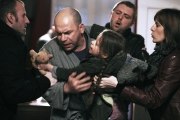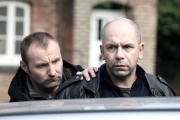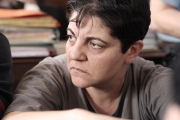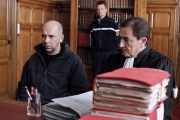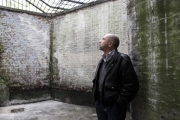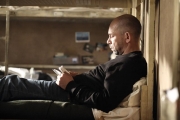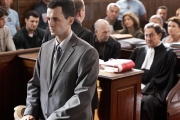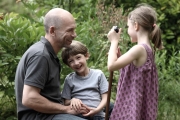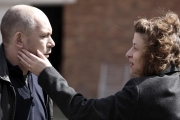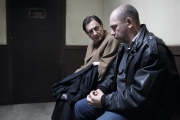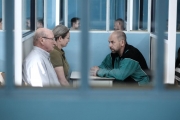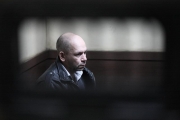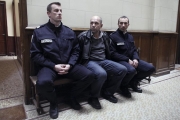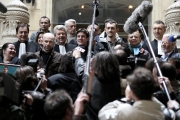Synopsis
Ripped from the headlines of the Outreau case – a French judicial disaster – this film recounts the plight of Alain Marécaux, arrested in 2001 along with his wife for horrible acts of pedophilia they never committed. This is the appalling story of an innocent man’s descent into Hell as he faces an incredibly unfair and inhuman judicial system – the story of his life and relatives, crushed by one of the most heinous miscarriages of justice of our time.
Cast & Crew
Director : Vincent Garenq
Screenwriter : Vincent Garenq
Starring : Philippe Torreton, Noémie Lvovsky, Wladimir Yordanoff, Raphaël Ferret, Michèle Goddet, Farida Ouchani, Olivier Claverie, Jean-Pierre Bagot, Sarah Lecarpentier
Schedule & Presentation
![]() Presentation by and discussion with director Vincent Garenq & actor Philippe Torreton
Presentation by and discussion with director Vincent Garenq & actor Philippe Torreton
Friday, March 30 – 7:00 p.m at the Byrd Theater ~ ![]() 1h42 ~ Parental Guidance
1h42 ~ Parental Guidance
More informations
Choose a picture to see the filmography (source : IMDB)
![]()
Were you aware of the Outreau trial before the movie?
Vaguely. I only truly learned about it when I read Alain Marécaux’s prison diary and it was a shock! In the book, you discover the amount of discrepancies and absurdities in this trial. The story immediately filled me with indignation and anger. Through the film, I wanted to convey these feelings to the viewer.
How did you come to bring the story to the screen?
Actually, the movie was already playing in my head as I read the book. Besides, when you come upon such a book, you do not hesitate more than two seconds to turn it into a movie: it goes without saying. The movie is not about Outreau but about Alain Marécaux, caught in the quagmire of the Outreau trial, which is completely different.
What was your approach?
First and foremost, I got in touch with Alain Marécaux and told him that I could not do this movie without him for two reasons. One was that it seemed essential to me that after having been betrayed by the justice system, he could not feel let down again with this movie. The other was that there were gaps in the book that only he could help me fill. So Alain assisted me throughout the scriptwriting and film-making process.
Did you engage in a considerable amount of research?
At the beginning, I relied on Alain to tell me the content of the interviews with Judge Burgaud, but he did not remember – probably because of the trauma and repression caused by the trial. Later, while going through the investigation file, I was able to familiarize myself with the minutes of these infamous interrogation sessions.
Are there any fictional scenes?
No because Alain’s story was strong enough not to overdo it. Also, it would not have been morally acceptable; we had to stick to what happened, we did not have the choice. Alain himself did not want to add to it; his only condition was that we did not alter the truth for the sake of cinema. We were on the same page.
From the first sequences, the viewer is on Alain Marécaux’s side. How did you create this absolute empathy for the protagonist?
It is Alain’s story that inspires empathy: how could you not identify with a human being wrongly accused? How could you not relate to the story of a man whose wife was also arrested and whose children were placed into foster care? It is the madness, the darkness, and the cruelty of this story that inspired us all, for the interpretation as much as the staging, the set research, the lighting and the costumes.
How did you approach the staging?
I wanted a bit of rawness in order to give the impression that things were taking place abruptly right in front of the camera, as if there were no staging. But at the same time, I also wanted the film to give us real visual and cinematographic pleasure, which is why I needed to find the right balance between fiction and documentary. A too polished and controlled light was definitely out of the question; the stage was often just lit with neon lights from the background scenery which, by the way, was also the closest possible to reality.
Did you have Torreton in mind from the start?
I would not let myself think of an actor before the script was finished. Besides, for such a role that required the actor to lose a lot of weight, we knew that the actor would choose us as much as we would pick him… I remember the tone in Philippe’s voice when he called me after having read the script; I immediately knew it would be him. He was truly moved and weakened by the story as if he were already in the character. Later, when I asked the touchy question about how much weight he intended to loose, he answered without an ounce of hesitation: “90 lbs, like Alain!” I told him he was crazy, that it would kill him! I indirectly know that he suffered a lot from the drastic diet that allowed him to lose the 60 lbs, but he never said anything to me. The only indication that I gave him was to try not to “act” but to “be” the character.
The media also has its share of responsibility in this case. How did you choose to address this issue?
Obviously, there was no way we were going to make up fake news! Therefore, we used archives of authentic news that were broadcasted on TV. When we see the TV news from Alain’s perspective, we become aware that the media contributed to the idea that the defendants were truly pedophiles. Besides, some journalists who have worked on these headlines refused to re-record their voices for the movie; they even asked that we change their names because they are now ashamed of their reporting. Elise Lucet, on the other hand, was more courageous and agreed to re-record fake names of journalists for us. I would like to thank her again for that. Very few journalists conducted their own inquiry. The majority of them would rely on the version of the prosecution. At the beginning of the first trial in Saint-Omer, the vast majority of them were convinced that they had come to witness the trial of a pedophile ring and it was only halfway through that they realized their mistake.
You chose not to use music in this movie. Was it decided from the outset?
I already thought of not adding any music during the writing process but I did not want to lack the imagination and contribution of a composer, i.e. Klaus Badelt. I also asked the editor not to use temporary music, as is customary, because I wanted the film to be able to stand without it. When we interrupted filming while Philippe Torreton was losing weight, we set up the first 70 minutes of the movie. And all those who then watched the editing process spontaneously told us – without our asking them – that we had to keep it that way, and not use any music for the film! Klaus Badelt himself could not see where it would be relevant to add some.
How was your meeting with Vincent Garenq?
When I met Vincent Garenq after having read the script, I told him that we (the actors) were there to uncover this kind of role. For me, it was much more than just cinema: it was a cry I had to shout out for another person.
It is the first time that you have played a real character. What difference does it make?
I first told myself that this was lucky: if I had a doubt, I could turn to Alain Marécaux and ask him. Moreover, after having met him, he told me that I could contact him whenever I wished. But in the end, I did not. Probably because I did not feel I had the right to: I did not have the nerve to ask, for example, at what moment he cracked or cried. All that I needed to know was in the script.
So how did you prepare for the part?
I isolated myself from everybody. I felt like it was on me, and only me, to “crack” and that nobody could help me – not even Vincent Garenq. Nobody can help an actor to play this type of character and emotional register. My only obsession was to be accurate: I asked myself what face one would have when put behind bars for the first time or when getting undressed in a small room where the cops brutally strip-search you… especially when it is the first time.
Did you not specially research the Outreau affair either?
I did not need to. I had but two bibles: Alain Marécaux’s book and the script, which he had approved. Even if I had become an expert on the case, that would not have helped me in my work as an actor. This is not a film on the Outreau trial: it is a movie about the ordeal Alain Marécaux had to go through for 3 years.
You agreed to lose 60 lbs for the needs of the role, and your transformation is truly staggering. How did you handle it?
I went to see a nutritionist who told me that he did not endorse the diet because I had too much weight to lose in too short a time. I was then forced to fend for myself, forcing myself on one of the most drastic diet and losing 0.66 lbs per day. In retrospect, I think I went into a depressive phase: I spent the whole time in tears, isolation and stupor wishing for death to happen.
How did the production welcome your determination?
The production had planned on calling upon a double for the scenes where I was supposed to be at the skinniest, but I preferred to avoid that. And indeed, when Vincent Garenq came to see me in the makeup trailer, very little time before the second part of filming, he told me that he would go call the double to tell him we would not need his services.
What state of mind were you in while filming?
As I was constantly being handcuffed, taken under the armpits and thrown into a van or in a car, I was filming in a state of permanent vulnerability. I remember that, as I was much thinner, merely the contact of the makeup artist’s hand on my shoulder and the hair of her brush on my cheek made me cry.
Can one come out of such a role completely unscathed?
Looking back, I often have tears in my eyes. What I tell myself is that this movie allowed me to meet a remarkable man – Alain Marécaux – and an exciting director. And for me as an actor, it was the first time I was given a role that talks about giving up. My character is a man who has lost his landmarks, who is trapped in his drama and his prison, and who loses hope. Therein is this film about giving up.
How did Alain Marécaux react after having seen you on the screen?
He told me that what struck him as bizarre was to see somebody embody his pain and feel like he was passing on the torch. I think that it is true, but only from a symbolic point of view. I also remember Alain’s godmother who at first was not pleased at the idea of an actor playing her godson. After having seen the movie, she told me one of the most beautiful things I had ever heard: “I know now what acting is about”.
Do you think the movie can raise awareness?
From what I have heard from lawyer friends who have seen it, this movie should be screened as part of legal training. What I hope above all is that the viewers become aware of the vulnerability of human testimony. And that of the men.
What are the profound failures brought to light by the Outreau trial?
Outreau is by excellence the example of a mishandled case that has proved that all of the fundamental rules of law were violated and reversed. In France, while one normally benefits from the presumption of innocence, Outreau showed that when one is entrenched in a court case, the presumption of guilt prevails over everything else. On the other hand, the Outreau affair violated a fundamental principle of our right which is that liberty should be the rule and provisionary detention the exception. Apart from Karine Duchochois, we all had been jailed!
How did you get involved in the Outreau trial?
I was living in a small town of northern France, about twenty miles from Outreau. When the social services found out that the Badaoui-Delay couple was incestuous, three of their children were placed with foster families in the town where my office was and attended the same school as my eldest son. Unfortunately for me, one of my sons became best friends with one of Myriam Badaoui’s boys: when the latter began to list those who participated in the molesting and rapes, he named his next-door neighbors in the city of Tour du Renard, area shopkeepers, as well as the parents of his girlfriend and best friend, which is how my name was brought up. But when Judge Burgaud asked Myriam Badaoui if there was a bailiff among the people mentioned, she said yes but mixed up the names and surnames of the two bailiffs with whom she had settled a debt. Burgaud explained to her that she was wrong because the children had said it was the Marécaux family. And Myriam nodded. That is how, based on the accusations of a little boy and the assertions of his mother, they came to arrest me one day in November at 6:30 am. This is how my wife, my children and I became a part of the Outreau affair.
In your opinion, who, from the start, is responsible for Outreau?
From the start, Outreau is the story of David Delplanque and Aurélie Grenon, an incestuous couple who abused their children and who included their neighbors in these molestations. From this incest case where four children were abused, Judge Burgaud made up a whole story. It is also why I often say that the diabolical couple in this trial is not Myriam Badaoui and Thierry Delay but Myriam Badaoui and Fabrice Burgaud. Together, they invented Outreau. Together, they made up a network. Together, they were the origin of this legal blunder. I even believe that Myriam Badaoui was like in love with Fabrice Burgaud: she even declared that, for the first time in her life, a man was listening to her. On his part, Burgaud found in her someone who agreed to everything he suggested: every time he wanted to have something asserted, he released her from prison to hear what he wanted to hear.
Apart from Judge Burgaud, how do we explain that none of those who had access to the case-file identified any of the numerous loopholes?
It is what I have often chalked up to intellectual laziness on behalf of the Public Prosecutor of Boulogne-sur-Mer and on behalf of the magistrates of the Douai Court of Appeals: they have always contented themselves with the upstream work. This is how the Public Prosecutor endorsed the investigation brought forward by Burgaud and how the Investigation Chamber also validated the work of these two other judges. If just one of them had bothered to open the file and show a minimum of good sense, he would have understood that the file was empty and that they had put innocent people in jail.
What about the psychologists?
They found Myriam Badaoui credible. However, none of the psychiatrists who have examined the accused, including me, found traits of a sexual offender in us. But the expert psychologist did find in 11 of the accused, including me, traits of a sexual offender, i.e. egocentrism and emotional immaturity. They also came up with such nonsense concerning the kids. For example, a psychologist explained to us that a child who draws a spider and color it in red could have been abused! Before Outreau, it was assumed that the child is lying. With Outreau, the word of the child became sacred. Ideally, we need a system more fair, which consider that the child might lie.
Why did the liberties and detention judge systematically follow Burgaud’s demands to leave you in jail?
The power to put the accused in custody once belonged to the investigating judge: they wanted to limit his powers by creating the judge of liberties and detention who, in my opinion, might as well be called the judge of detention. This magistrate acquaints himself with the content of the file about 10 minutes before the appearance: how would he know the case?
What made you regain hope when you were in prison?
I went through different stages while I was in prison. At the very beginning, I was filled with hope because I was convinced that I was about to be released anytime soon. When eight months later I realized that nothing had changed, I attempted suicide by drug overdose. When I found myself hospitalized, I regained hope because my wife had been released. However, my situation did not change and I closed myself off into the image of the model prisoner, telling myself I would be there for 20 years! I took classes, went to the library and joined bible study groups. Then, after a year and a half, I told myself that I would never be able to keep on like this. This is how I decided to stop eating, not so much in protest but so as to die. I was transferred to the prison hospital in Fresnes (near Paris) where they let go of me after I fasted for 98 days, dropping from 213 to 105 lbs.
What safeguards could be put in place to avoid a new “Outreau”?
I believe that a reform within the judicial system is necessary. When you choose to be a judge, not only you choose a career where you are expected to apply the law, but also one where you must be aware that you are dealing with human beings and that your decisions will influence their lives and the lives of those around them.
What did you think of the Parliamentary Commission of Inquiry?
The Parliamentary Commission of Inquiry is part of my reconstruction, as were the publication of my book Chronique de mon erreur judiciaire (Chronicle of my Miscarriage of Justice), my professional recognition as a bailiff, and now the film Guilty. What was appalling was to see the alarmed looks of deputies who were suddenly wondering how innocent people could have been incarcerated despite the laws. The Commission fathered real hope, but unfortunately nothing concrete resulted from it except the mini-reform Clément. As a result, other “Outreau cases” might happen in the future. A public opinion group continues to believe that some people acquitted by the Outreau trial have a responsibility to share in the affair. Guilty does not aim to address the Outreau trial but to make people think and show how, in France, an individual who leads an orderly life and who does not ask anything from anyone might see his existence turned upside down overnight.
Do you believe that the media is also partially responsible?
Absolutely. When one reads the first press articles and sees the reports from November 2001, it is frightening: our guilt was proven. I blame journalists for not carrying out proper research but instead satisfy themselves with the intentional leaks from the prosecution, the police, and the victims’ lawyers.
Do you still believe in justice?
Yes, because I am a bailiff and the judicial institution is a pillar of our democracy: I truly think that Fabrice Burgaud is the exception and that most of his colleagues are doing their job with integrity and humanity. When Outreau ended for me, I even wanted to become a judge. However, I was discouraged to do so. In retrospect, I was probably right to follow this advice because the body of judges would always have made me feel like I was not welcomed.
Do you still resent Fabrice Burgaud?
I resented him for a while but this hate quickly became anger. I am a reformed protestant and my faith helped me a lot during those four years of nightmare — to me, Outreau is an accident of life that plunged me into deep coma. Therefore, I quickly forgave that little boy who accused me and I even managed to forgive Myriam Badaoui, but never Fabrice Burgaud. He never asked for forgiveness nor even apologized, so that is not helping.
In what state of mind were you when writing Chronique de mon Erreur Judiciaire (Chronicle of my Miscarriage of Justice)?
At the beginning, it was a bedside notebook that I wrote in every day of my incarceration and which I kept filling during the trial of Saint-Omer. But I had never imagined that these notes would one day become a book. Flammarion also had the courage to edit someone that had been condemned by the highest criminal court. This book helped me a lot. Today, I am still writing because I want to add several chapters to the book, which stopped at Saint-Omer.
What was your reaction when Vincent Garenq and Christophe Rossignon came to you?
I first received a letter from Flammarion to inform me of their intentions. Initially, the idea did not please me. When I met Vincent and we discussed at length, my prejudices vanished: I discovered a director who understood my suffering and who knew that this film could not be a fiction. The second time, I met Christophe Rossignon who sealed the deal. I will always remember what he said to me: “You own the rights over the life and death of the movie.” This meant I could tell him to stop filming one day or the following day because I did not recognize myself in the movie. It was a privileged. I also asked Vincent and Christophe if my sons could work on the film: they committed themselves to it and kept their word. Thanks to them, I have overcome a new step in my personal reconstruction and I think positive of Outreau.
Tell me about your meeting with Philippe Torreton.
When Vincent Garenq met Philippe Torreton, he called me to tell me he had found someone who was already in the character. When I met Philippe, we immediately got along. I noticed he wanted to stick to the character and, above all, not betray my suffering. I was right because he kept his word. He even lost 60 lbs to fit perfectly to the role.
How did you feel on the set, seeing your ordeal “played” by comedians?
It helped me, actually, because I saw that I was no longer the only one to bear my suffering. And even though it was an actor, he acted so well that I had the impression of sharing this burden. Certain scenes were very hard for me to relive: when Philippe learns of the death of his mother, I was truly overwhelmed because my grieving is not over yet. But even though it was sometimes difficult, it was a joy to come on set and see the demand of Vincent, behind the camera, or Philippe in my role.
What could be the impact of such a film on the public opinion?
I would like the film to be able to reach an audience that the book has not found and to show the state of the justice system, and the prisons in France. The Outreau nightmare started on 14th November 2001; then years later, I am closing this chapter forever, which is a huge step for me before the final one: forgiving Burgaud.



